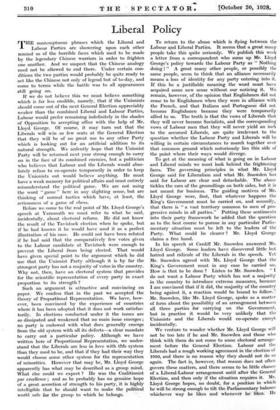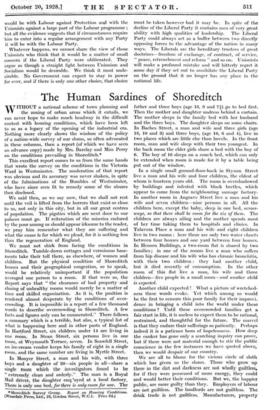Liberal Policy
THE contemptuous phrases which the Liberal and Labour Parties are showering upon each other remind us of the horrible faces which used to be made by the legendary Chinese warriors in order to frighten one another. And we suspect that the Chinese analogy need not be allowed to end there. Under certain con- ditions the two parties would probably be quite ready to act like the Chinese not only of legend but of to-day, and come to terms while the battle was to all appearances still going on.
If we do not believe this we must believe something which is far less credible, namely, that if the Unionists should come out of the next General Election appreciably weaker than the combined Liberal and Labour Parties, Labour would prefer remaining indefinitely in the shades of Opposition to accepting office with the help of Mr. Lloyd George. Of course, it may turn out that the Liberals will win so few seats at the General Election that they will be of no great use to any other Party which is looking out for an artificial addition to its natural strength. We ardently hope that the Unionist Party will be returned next year strong enough to carry on in the face of its combined enemies, but a politician who believes that Labour and the Liberals would abso- lutely refuse to co-operate temporarily in order to keep the Unionists out would believe anything. He must have a weak memory for political affairs and must entirely misunderstand the political game. We are not using the word " game " here in any slighting sense, but are thinking of normal tactics which have, at least, the seriousness of a game of chess.
Before we come to the real point of Mr. Lloyd George's speech at Yarmouth we must refer to what he said, incidentally, about electoral reform. He did not know the result of the Tavistock election when he spoke, but if he had known it he would have used it as a perfect illustration of his case. He could not have been refuted if he had said that the comparatively few votes given to the Labour candidate at Tavistock were enough to prevent the Liberal from being elected. That would have given special point to the argument which he did use that the Unionist Party although it is by far the strongest party has not a majority of votes in the country. Why not, then, haVe an electoral system that provides for the scientific representation of every party in exact proportion to its strength ?
Such an argument is attractive and convincing on paper. We confess that in the past we accepted the theory of Proportional Representation. We have, how- ever, been convinced by the experience of countries where it has been adopted that it does not work satisfac- torily. In elections conducted under it the issues are so dissipated and weakened that no main issue emerges ; no party is endowed with what does generally emerge from the old system with all its defects—a clear mandate to carry out a particular policy. Although we have written here of Proportional Representation, we under- stand that the Liberals are less in love with this system than they used to be, and that if they had their way they would choose some other system for the representation of minorities. However that may be, Mr. Lloyd George apparently has what may be described as a group mind. What else could we expect ? He was the Coalitionist par excellence ; and as he probably has no gendine hope of a great accretion of strength to his party, it is highly intelligible that he should want to make the political world safe for the group to which he belongs. To return to the abuse which is flying between the Labour and Liberal Parties. It seems that a great many people take this quite seriously. We publish this week a letter from a correspondent who sums up Mr. Lloyd George's policy towards the Labour Party as " Nothing doing ! " A great many other people, or possibly the same people, seem to think that an alliance necessarily means a loss of identity for any party entering into it. If this be a justifiable meaning the word must have acquired some new sense without our noticing it. We remain, however, of the opinion that Englishmen did not cease to be Englishmen when they were in alliance with the French, and that Italians and Portuguese did not become Englishmen because they were temporarily allied to us. The truth is that the vows of Liberals that they will never become Socialists, and the corresponding vows of Labour men that they will never yield an inch to the accursed Liberals, are quite irrelevant to the question whether the Labour Party and Liberals will be willing in certain circumstances to march together over that common ground which notoriously lies this side of the point where their ways would diverge.
To get at the meaning of what is going on in Labour and Liberal minds we must look behind the frightening faces. The governing principles in what Mr. Lloyd George said for Liberalism and what Mr. Snowden has said for Labour are clear and detachable. The abuse tickles the ears of the groundlings on both sides, but it is not meant for business. The guiding motives of Mr. Lloyd George were, first, that whatever happens the King's Government must be carried on, and secondly, that there is " a vast territory common to men of pro- gressive minds in all parties." Putting these sentiments into their party framework he added that the question as to the best course to pursue in any particular Parlia- mentary situation must be left to the leaders of the Party. What could be clearer ? Mr. Lloyd George claims a free hand.
In his speech at Cardiff Mr. Snowden answered Mr. Lloyd George. Some leaders have discovered little but hatred and ridicule of the Liberals in the speech. Yet Mr. Snowden agreed with Mr. Lloyd George that the King's Government must in any case be carried on.
How is that to be done ? Listen to Mr. Snowden. " I do not want a Labour Party which has not a majority in the country to introduce extreme measures, because I am convinced that if it did, the majority of the country being against it, a reaction would be bound to follow.'
Mr. Snowden, like Mr. Lloyd George, spoke as a matter of form about the possibility of an arrangement between all three parties for carrying on the Government, but in practice it would be very unlikely that the Unionists and the Liberals would co-operate except incidentally.
We venture to wonder whether Mr. Lloyd George will not be too late if he and Mr. Snowden and those who think with them do not come to some electoral arrange- ment before the General Election. Labour and the Liberals had a rough working agreement in the election of 1910, and there is no reason why they should not do so again. The fact is, however, that reason does not often govern these matters, and there seems to be little chance of a Liberal-Labour arrangement until after the General Election, and then only if the situation requires it. Mr. Lloyd George hopes, no doubt, for: a position in which he will be strong enough to tilt the Parliamentary balance whichever way he likes and whenever he likes: He would be with Labour against Protection and with the Unionists against a large part of the Labour programme ; but all the evidence suggests that if circumstances require "him to enter into a regular arrangement with any Party it will be with the Labour Party.
Whatever happens, we cannot share the view of those Unionists who think that it would be a matter of small concern if the Liberal Party were obliterated. They argue as though a straight fight between Unionism and Socialism would be desirable. We think it most unde- sirable. No Government can expect to stay in power for ever, and if there is only one other choice, that choice must be taken however bad it may be. In spite of the decline of the Liberal Party it contains men of very great ability with high qualities of leadership. The Liberal Party could always act as a buffer between two directly opposing forces to the advantage of the nation in many ways. The Liberals are the hereditary trustees of great doctrines—freedom of exchange, of contract, of service, peace, retrenchment and reform " and so on. Unionists will make a profound mistake and will bitterly regret it some day if they set out to annihilate the Liberal Party on the ground that it no longer has any place in the national life.































































 Previous page
Previous page